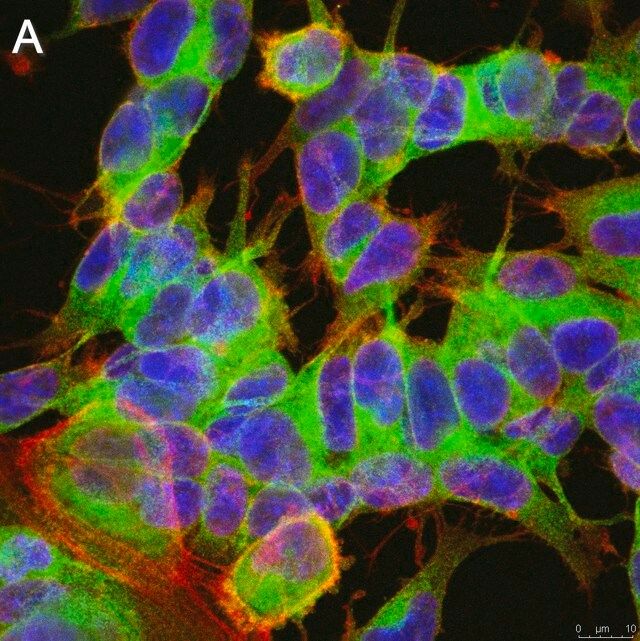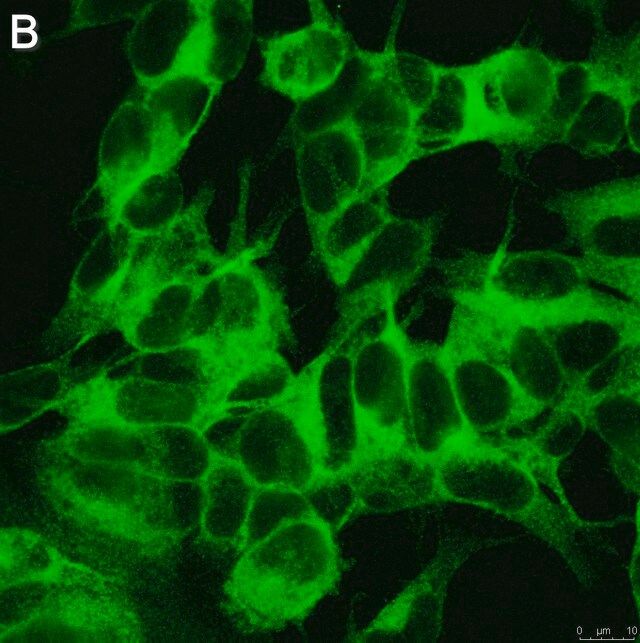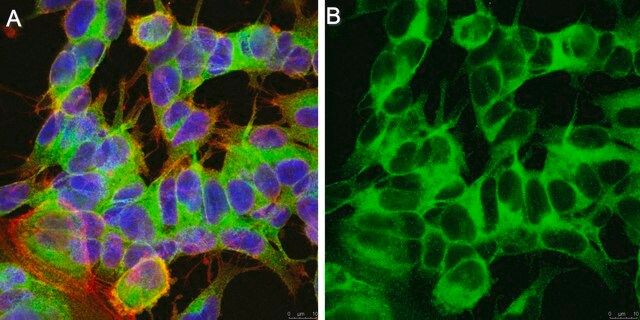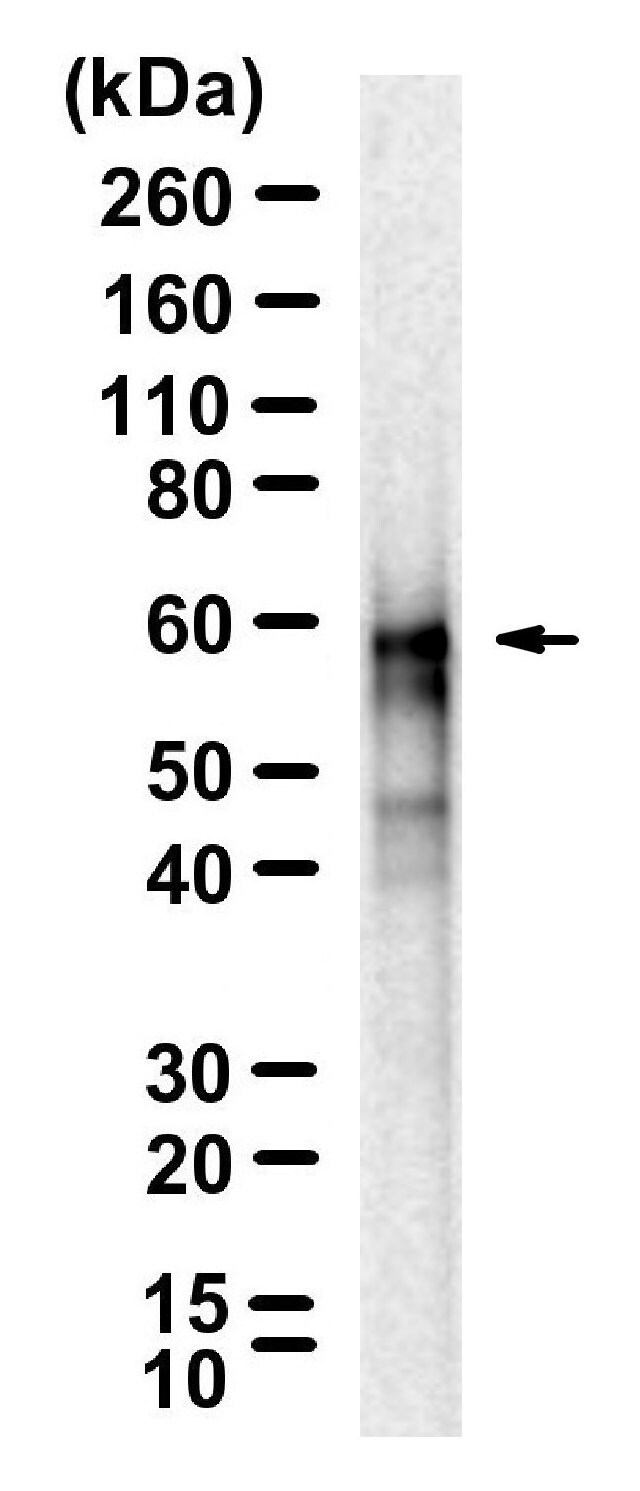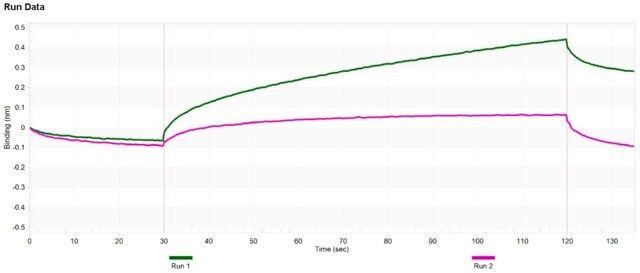您的位置:首页 > 产品中心 > Anti-Tau Antibody, clone 3D20 ZooMAb® Rabbit Monoclonal
Anti-Tau Antibody, clone 3D20 ZooMAb® Rabbit Monoclonal
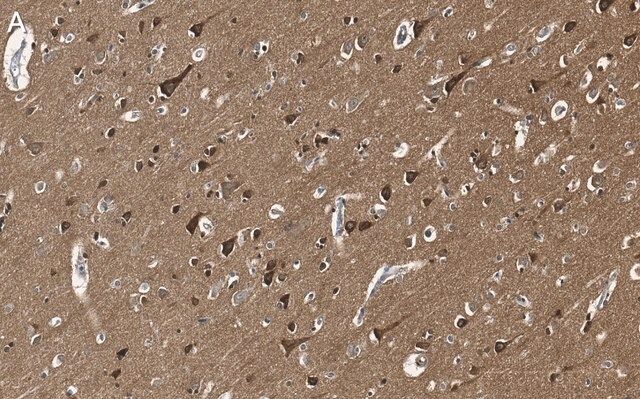


| 产品编号: | 4083228 |
| 规格: | recombinant, expressed in HEK 293 cells |
| 包装规格: | 25 μL,4 X 25 μL |
| 产品类别: | 进口试剂 |
| 品牌: | Sigma-Aldrich |
| 优惠价: | 立即咨询 |
产品别名
Anti-Tau Antibody, clone 3D20 ZooMAb® Rabbit Monoclonal
Microtubule-associated protein tau
Paired helical filament-tau
Neurofibrillary tangle protein
PHF-tau
产品性质
| biological source【生物来源】 | rabbit |
| Quality Level【质量水平】 | 200 |
| recombinant【重组】 | expressed in HEK 293 cells |
| conjugate【偶联物】 | unconjugated |
| antibody form【抗体形式】 | purified antibody |
| clone【克隆】 | recombinant monoclonal |
| product line【产品线】 | ZooMAb® learn more |
| form【形式】 | lyophilized |
| mol wt【分子量】 | calculated mol wt 78.93 kDa observed mol wt ~ 60 kDa |
| species reactivity | mouse, human, rat |
| packaging【包装】 | antibody small pack of 25 μL |
| greener alternative product characteristics【环保替代产品特性】 | Waste Prevention Designing Safer Chemicals Design for Energy Efficiency Learn more about the Principles of Green Chemistry. |
| enhanced validation【增强验证】 | recombinant expression Learn more about Antibody Enhanced Validation |
| technique(s) | affinity binding assay: suitable immunocytochemistry: suitable immunohistochemistry (formalin-fixed, paraffin-embedded sections): suitable western blot: suitable |
| isotype【同位素/亚型】 | IgG |
| greener alternative category【环保替代产品分类】 | Aligned |
| shipped in【运输】 | ambient |
| storage temp.【储存温度】 | 2-8℃ |
基本信息
| General description【一般描述】 | ZooMAb antibodies represent an entirely new generation of recombinant monoclonal antibodies. Each ZooMAb antibody is manufactured using our proprietary recombinant expression system, purified to homogeneity, and precisely dispensed to produce robust and highly reproducible lot-to-lot consistency. Only top-performing clones are released for use by researchers. Each antibody is validated for high specificity and affinity across multiple applications, including its most commonly used application. ZooMAb antibodies are reliably available and ready to ship when you need them. Learn more about ZooMAb here. |
| Specificity【特异性】 | Clone 3D20 is a ZooMAb rabbit recombinant monoclonal antibody that specifically detects Microtubule-associated protein tau (Tau). It targets an epitope within 19 amino acids form the N-terminal half. |
| Immunogen【免疫原】 | KLH-conjugated linear peptide corresponding to 19 amino acids from the N-terminal half of human Tau protein. |
| Application【应用】 | Anti-Tau, clone 3D20 ZooMAb, Cat. No. ZRB1092, is a recombinant Rabbit monoclonal antibody that specifically targets Tau and has been tested for use in Affinity Binding Assay, Immunocytochemistry, Immunohistochemistry (Paraffin), and Western Blotting. Quality Control Testing Western Blotting Analysis: A 1:1,000 dilution of this antibody detected Tau in Human Brain tissue lysate.Tested applicationsImmunocytochemistry Analysis): A 1:100 dilution from a representative lot detected Tau in SH-SY5Y cells.Immunohistochemistry (Paraffin) Analysis: A 1:100 dilution from a representative lot detected Tau in human cerebral cortex tissue sections.Affinity Binding Assay: A representative lot of this antibody bound Tau peptide with a KD of 9.0 x 10-6 in an affinity binding assay.Note: Actual optimal working dilutions must be determined by end user as specimens, and experimental conditions may vary with the end user |
| Physical form【外形】 | Purified recombinant rabbit monoclonal antibody IgG, lyophilized in PBS with 5% Trehalose, normal appearance a coarse or translucent resin. Contains no biocide or preservatives, such as azide, or any animal by-products. Larger pack sizes provided as multiples of 25 μL. |
| Reconstitution【重悬】 | 30 μg/mL after reconstitution at 25 μL per vial. Please refer to guidance on suggested starting dilutions and/or titers per application and sample type. |
| Legal Information【法律信息】 | ZooMAb is a registered trademark of Merck KGaA, Darmstadt, Germany |
产品说明
| Target description【目标描述】 | Microtubule-associated protein tau (UniProt: P10636; also known as Neurofibrillary tangle protein, Paired helical filament-tau, PHF-tau) is encoded by the MAPT (also known as MAPTL, MTBT1, TAU) gene (Gene ID: 4137) in human. Microtubule-associated protein tau is shown to be expressed in neurons. It is mostly found in axons, in the cytosol, and in association with plasma membrane components. Isoform PNS-tau is expressed in the peripheral nervous system while the others are expressed in the central nervous system. Nine isoforms of Tau have been described that are generated by alternative splicing. Tau proteins promote microtubule assembly and stability and may also be involved in the establishment and maintenance of neuronal polarity. The C-terminus binds axonal microtubules while the N-terminus binds neural plasma membrane components, thus serving as a linker protein between both. The short isoforms are reported to allow plasticity of the cytoskeleton whereas the longer isoforms may preferentially play a role in its stabilization. In Alzheimer disease (AD), the neuronal cytoskeleton in the brain is progressively disrupted and replaced by tangles of paired helical filaments (PHF) and straight filaments, mainly composed of hyperphosphorylated forms of Tau. In AD cerebral cortex, O-GlcNAcylation is greatly reduced leading to an increase in Tau phosphorylation. Phosphorylation at serine and threonine residues in S-P or T-P motifs by proline-directed protein kinases (PDPK1, CDK1, CDK5, GSK3, MAPK) and at serine residues in K-X-G-S motifs by MARK1, MARK2, MARK3 or MARK4, causes detachment from microtubules, and their disassembly. In AD brain Tau accumulates in both the somatodendritic and axonal domains of neurons and in the soma as neurofibrillary tangles (NFTs). Tau oligomers are reported to be neurotoxic when applied extracellularly to cultured neuronal cells and can induce neurodegeneration and synaptic and mitochondrial dysfunction in vivo. This ZooMAb recombinant monoclonal antibody, generated by our propriety technology, offers significantly enhanced specificity, affinity, reproducibility, and stability over conventional monoclonals. (Ref.: Taniguchi Watanabe, S., et al. (2016). Acta Neuropathol. 131(2); 267-280; Ando K., et al. (2010). Biochem. Soc. Trans. 38(4); 1001-1005). |
| Storage and Stability【储存及稳定性】 | Recommend storage of lyophilized product at 2-8℃; Before reconstitution, micro-centrifuge vials briefly to spin down material to bottom of the vial; Reconstitute each vial by adding 25 μL of filtered lab grade water or PBS; Reconstituted antibodies can be stored at 2-8℃, or -20℃ for long term storage. Avoid repeated freeze-thaws. |
| Disclaimer【免责声明】 | Unless otherwise stated in our catalog or other company documentation accompanying the product(s), our products are intended for research use only and are not to be used for any other purpose, which includes but is not limited to, unauthorized commercial uses, in vitro diagnostic uses, ex vivo or in vivo therapeutic uses or any type of consumption or application to humans or animals. |
安全信息
| Storage Class Code【储存分类代码】 | 11 - Combustible Solids |
| WGK | WGK 1 |







